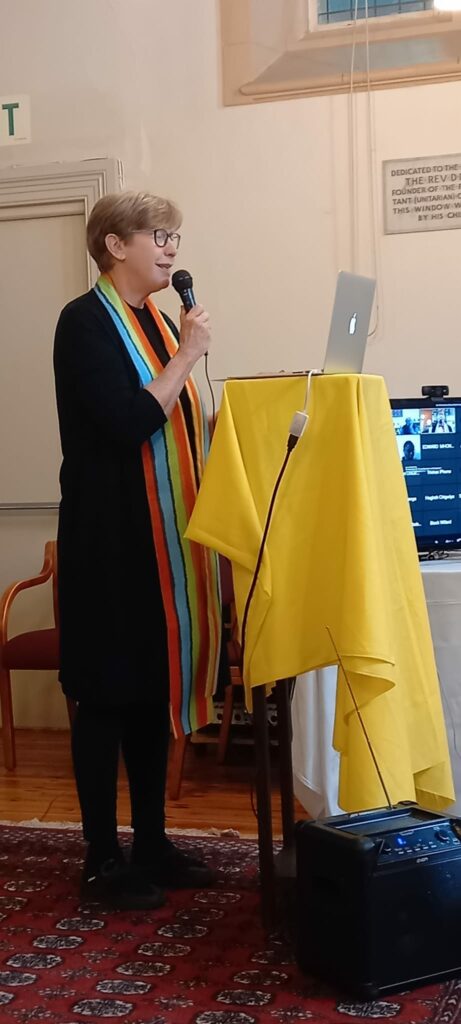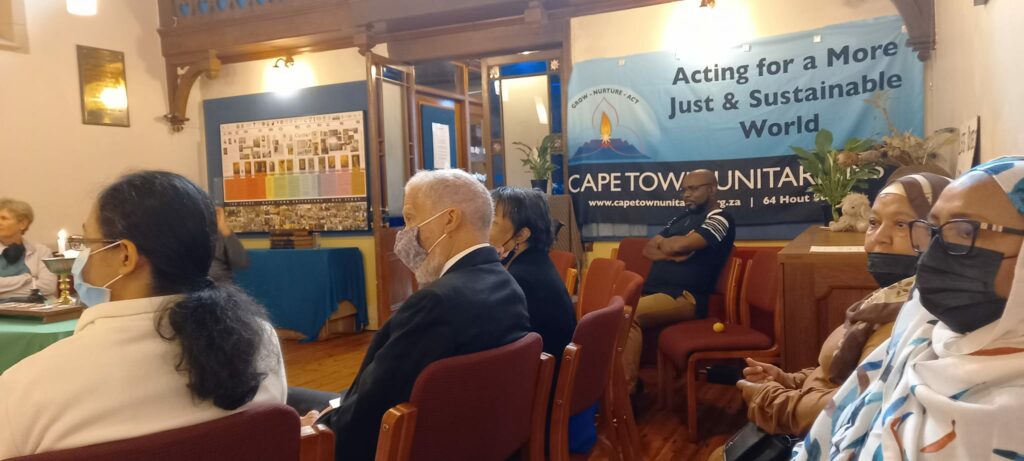What does your faith say about the protection of animals and their habitats?
- Published:
Sunday 5 June 2022 was the UN World Environment Day, as well as National Animal Rescue Day. It was the perfect time to discuss the protection of animals and their habitats from a faith perspective.
 Safcei collaborated with the Rev Ven Nima Taylor of the Cape Town Unitarians to create the hybrid event, broadcast live from the historic Cape Town Unitarian Church in Hout Street, Cape Town.
Safcei collaborated with the Rev Ven Nima Taylor of the Cape Town Unitarians to create the hybrid event, broadcast live from the historic Cape Town Unitarian Church in Hout Street, Cape Town.
Rev Nima opened the ceremony with a prayer, and the lighting of the chalice which is a beautiful ceremony bringing everyone into presence. Rev Berry Behr, Safcei’s Faith Leader Liaison, then set the context for the speakers, outlining the history of World Environment Day and questioning why this largest global platform for Environmental Awareness has not had significant impact since its inception in 1973. We looked at the increase in Climate Refugeeism, and the fact that it takes 1.6 x our current earth resources to keep up with the demand of our current lifestyles. In other words, we are currently borrowing from Peter to Pay Paul – an unsustainable model.
Rev Berry said: “Today’s UN World Environment Day is not so much a celebration of a planet, as a pre-emptive funeral for it, and a memorial ceremony for the species that once graced our beautiful planet, and that have been destroyed.”
She quoted from studies that show the Fynbos Biome, endemic to the Cape and the smallest biome in the world, to be the site of the second greatest biodiversity loss only behind Hawaii.
National Animal Rights Day also asks us to look at how we treat all animals, not only domestic pets. We destroy habitats for greed, we force cruel industrialised farming methods on animals and then we literally eat the stress we have caused them to endure.
Rev Berry concluded by naming 10 species that had become officially extinct in Africa in the last 50 years, and Rev Nima sounded the gong for each species.
The panellists represented Christianity (Rev Dr Lionel Louw, Chair of the Western Cape SA Council of Churches), Brahma Kumaris (Sr Nita Makanjee of both Western Cape Religious Leaders Forum and Cape Town Interfaith Initiative) and Islam (Shaykh Ismail Keraan of the Al Azhar Mosque in District Six).
Dr Louw unpacked a number of Bible verses where humanity is called upon to care deeply for the Earth and all the Creatures who live on the Earth. He concluded with Genesis 1:26 which says: “God gave man dominion…” and helped us to understand that dominion in this context means a responsibility to care for, and not the right to dominate and control. He made the link to GBV, saying that nowhere does the Bible say that God gave man dominion over woman.
Sister Nita shared the Brahma Kumaris perspective on food, and urged listeners towards a conscious, vegan diet of food prepared strictly in a loving and compassionate environment as the energy of the food we eat affects us physically, mentally and spiritually.

Shaykh Keraan spoke with heartfelt compassion about the need to treat all animals with consideration and kindness, and quoted a number of Quranic verses, such as: “Allah has given humans dominion over other creatures. He has made them 'vicegerents on earth' (Qur'an 35:39). This is a duty and a responsibility. Muslims should not abuse their privilege or exploit animals, because God will punish them if they abuse this power.”
Shaykh said there are more than 200 verses in the Quran dealing with animals and six chapters of the Quran are named after animals or insects.
Animals are considered as gifts to humanity, praised for their beauty and help, so Islam has set kindness and mercy towards them as one of its founding values. This includes being mindful of and protecting their habitats.
Watch the Regional Interfaith Dialogue recording below.
By Rev Berry Behr
https://www.youtube.com/watch?v=aSoJ7WY6BtM
Who we are

SAFCEI (Southern African Faith Communities’ Environment Institute) is a multi-faith organisation committed to supporting faith leaders and their communities in Southern Africa to increase awareness, understanding and action on eco-justice, sustainable living and climate change.
Featured Articles
-

South Africa: Who Ends Up Paying If DMRE Cooks the Price of Nuclear Power?
-

South Africa’s nuclear energy expansion plans continue to draw criticism, environmental NGOs chew over legal challenge
-

Earthlife Africa and SAFCEI respond to latest unsettling nuclear news regarding the ministerial determination
-

Open Wing Alliance Africa (Virtual) Summit 2023
-

The Green Connection and SAFCEI respond to energy minister's divisive and deflecting comments
-

Job Vacancy: FLEAT Coordinator







